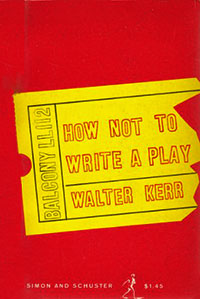
When I was a high school upperclassman and had already committed to a life in theatre (as only an adolescent can do) I was an avid reader of Harold Clurman, the highly influential New York director, and critic. I also read another critic (Pulitzer Prize winner) Walter Kerr, whose book, How Not to Write a Play, I devoured.
 Imbedded in their understanding of the theater was the notion of “beats,” a kind of rhythmic structure that made, they said, for good theatre. It was the sum total of these beats that created the plot.
Imbedded in their understanding of the theater was the notion of “beats,” a kind of rhythmic structure that made, they said, for good theatre. It was the sum total of these beats that created the plot.
In essence, these “beats,” move the plot forward by creating specific moments of character revelation, achievement, or understanding. Such ticks, all in all, create a plot in which all the characters evolve towards a full resolution of the play’s basic conflict.
Now, when I went on to Antioch College, and was allowed in my freshman year to take a course in playwriting, you may be sure I jumped at the opportunity.
My professor, Paul Treichler, (who was influential in developing regional theatre in America) had a singular approach to teaching playwriting. He created a form that we students were required to fill out in which we were to break down the plays we were attempting to write into scenic “beats.” Even for a one-act play, there might be thirty beats.
These “beats,” that my teacher required were no different than what Clurman and Kerr saw as essential to narrative structure.
It should come as no surprise that I was happy to adopt this system to write the plays I was attempting to create.
Jump ten years later. I gave up writing plays but turned to write books for young people.
But so embedded in me was that system of writing, and creating narratives for novels, that I still used that system of beats.
Indeed, the structure of my novels is such that (at least in creation) there are often short chapters. To be sure, at a certain point those short chapters are often blended, but they didn’t begin that way.
I don’t believe there are rules for writing. Whatever works for you—and produces good writing—is all you need. That’s the way I found my rules.
I, as a very young writer, found my way using that theatrical “beat” system. So it was that Richard Jackson, my long-time editor, once said to me, “You have never stopped writing plays.”
I am currently at work on a new novel and have not been happy with the way the plot has been unfolding. What did I do? I broke it down into its “beats” and established a narrative movement that worked much better.
The beat goes on.
6 thoughts on “Beats”
May your BEAT go on!
Yes! I’m all about the beats, too . ..
We’re the beat generation!
Congrats on the new novel! Any idea on the pub date or perhaps a working title, so we can look forward to its launch?
No title but due in to editor Nov 1 22. Stay tuned.
I always learn something here. Your generosity is much appreciated!